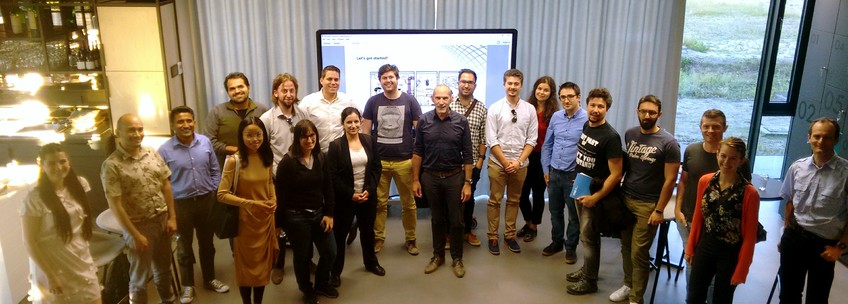Machine Learning with Big Data

Machine Learning with Big Data
On June 28th KIVI International Engineers organized an evening session about applications of Machine Learning using big data. Experts from Philips Research and TU Delft shared their knowledge and insight, ranging from deep learning data pipeline design, all the way to social benefits of using data analysis on the Dutch railway system.
21 participants joined the discussion about implications of using certain machine learning techniques and how domain-specific knowledge is fundamental for the interpretation of the algorithms’ results. The presentations were followed by networking drinks where the audience had a chance of closer interaction with the experts and each other.
We are very pleased as well to have counted with the presence of engineers freshly-arrived to the Netherlands, from in- and outside of the European Union. Welcome!
Presentations can be delivered on request: kie@kivi.nl
KIVI International Engineers organizes a seminar on the discipline of Data science, and on the potential of Machine learning to solve real-world problems through utilization of Big data, among others. Speakers are:
1. Dr. Alfredo Núñez Vicencio, TU Delft, Section of Railway Engineering;
-- Talk abstract: In his talk, Dr. Vicencio shall discuss examples of big data in railway infrastructure. First, a short introduction about railway infrastructure and why the need of big data to "keep the trains running". Then, some examples are discussed. For rail monitoring, axle box acceleration system and video image processing are presented. For other monitoring purposes, big data systems from the industry are also discussed. In conclusion, for railway related applications, the knowledge about the physical railway system must be included to guarantee a successful big data solution.
Presentation Dr. Alfredo Núñez Vicencio
2. Dr. Stojan Trajanovski , Philips Research Eindhoven, Data Science;
-- Talk abstract: Lung cancer is the leading cause of cancer mortality in the US, responsible for more deaths than breast, prostate, colon and pancreas cancer combined. Recent results indicate that lung cancer mortality rates can be reduced through screening of high-risk patients via chest computed tomography (CT) scans, since this not only leads to detection of nodules, but also detects malignancy based on imaging characteristics. Developing advanced image analysis research tools for such nodule classification is therefore an important ongoing research topic. Dr. Trajanovski shall speak about a new lung cancer risk assessment framework, associated with low-dose chest CT scans, that he has developed with his team at Philips Research. Employing a nodule detector, the framework utilizes the image area around the nodules as well as nodule features, providing them as inputs to a neural network that estimates the malignancy risk of the whole CT scan. His results on large clinical datasets indicate that this novel proposal has better performance in assessing cancer malignancy compared to existing techniques.
Presentation Dr. Stojan Trajanovski
Programma |
|
|---|---|
| - uur | Welcome address |
| - uur | Opening and introduction by KIVI International Engineers board |
| - uur | First talk, including Q&A |
| - uur | Second talk, including Q&A |
| - uur | Dialogue and open discussion |
| - uur | Networking drinks |
| - uur | Closing |
